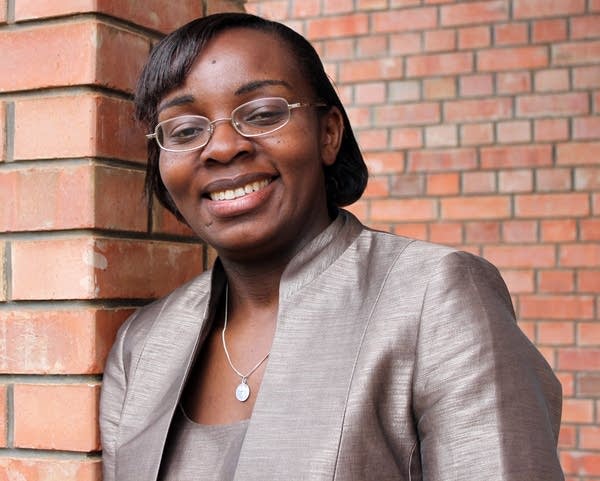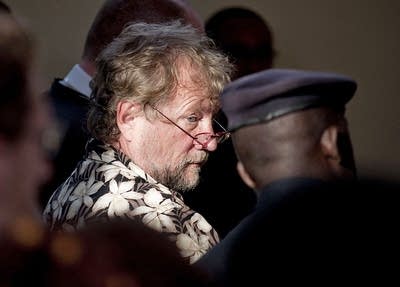After three weeks in Rwandan jail, Erlinder might soon learn fate
Go Deeper.
Create an account or log in to save stories.
Like this?
Thanks for liking this story! We have added it to a list of your favorite stories.

Peter Erlinder may soon learn of his fate in a Rwandan jail on Thursday, when an appeals court is expected to decide whether to release the jailed St. Paul law professor on bail.
Erlinder is now in his third week behind bars, charged by Rwandan officials with denying the country's 1994 genocide, an accusation he denies.
His daughter, Sarah Erlinder, said as hard as she tries to remain optimistic, the thought of him dying is always at the back of her mind.
She hasn't been able to see or speak to her father, so she combs the Internet. Photos taken of him Monday in a Kigali courtroom shocked her.
Turn Up Your Support
MPR News helps you turn down the noise and build shared understanding. Turn up your support for this public resource and keep trusted journalism accessible to all.
"He has this new shaved head; he has this new pink prison gown. He looks very mortal, and that's upsetting to see."
Erlinder, 62, was under the constant watch of doctors in Minnesota, his daughter said. He has a non-cancerous tumor on his skull, was hospitalized last year for a bleeding ulcer, and was born with a heart condition that will require him to at some point undergo surgery.
His family is paying for his meals to be delivered to him through U.S. embassy officials, afraid that he could be poisoned by prison staff.
Erlinder also admitted in court that he tried to kill himself while in jail through a pill overdose. He told a judge he has struggled with depression for nearly 25 years.
His family this week is traveling to New York, where the head of the International Criminal Tribunal for Rwanda will give the United Nations Security Council a progress report on Friday. Erlinder's supporters want the Rwandan government to drop the charges against him. But Sarah Erlinder said the second-best scenario would be for him to be released on bail and returned to the United States so he can receive medical help.
She said her father could then return to Kigali for a trial, if one is held.
"Knowing my dad, he's not going to run back and hide," Sarah Erlinder said. "If they want to litigate the case, he would go back, I'm sure, and see it through."

But many hope the case won't come to that. Erlinder is believed to be the first foreigner to be charged under Rwanda's broad rules against so-called genocide denial. Human-rights groups and the legal community fear Erlinder's detention could set a dangerous precedent for defense lawyers.
The St. Paul attorney is defending alleged perpetrators of the Rwandan genocide at the U.N.-backed tribunal in Tanzania. The tribunal wrote Tuesday to the Rwandan government requesting Erlinder's release, saying he is protected by diplomatic immunity. Erlinder doesn't deny the mass killings, but he has filed a lawsuit accusing the current Rwandan president of helping trigger them.
The letter from the tribunal's registrar elevates Erlinder's case from a mere political discussion, said Greg Stanton, a former State Department official who crafted the U.N. Security Council resolutions that created the tribunal.
Stanton said the tribunal's registrar, Adama Dieng, is reminding Rwanda officials of international law.
"I think he's saying, 'Look, this is the law. It was passed by the U.N. Security Council. It has the force of law, and it's applicable to all states. Please don't break it.' " Stanton said.
But the Rwandan government isn't required to abide by the tribunal's request, Stanton said.

For their part, Rwandan authorities have said Erlinder was not charged for his role before the tribunal, but because of papers he wrote outside of Rwanda questioning the genocide.
"This is not about what Peter Erlinder said in his defense of people accused of genocide, what he said in the courtroom," said Louise Mushikiwabo, Rwanda's foreign minister. "I'm talking about what I've seen in the public domain."
Secretary of State Hillary Clinton told reporters this week she was concerned about Erlinder's case.
Clinton said she understood Rwanda's anxiety over comments that it considers to be "genocide rejectionism." But she said, "I think there are ways of dealing with that legitimate concern other than politically acting against opposition figures or lawyers and others."
Erlinder's wife, Masako Usui, met Tuesday with a British diplomat Tuesday and planned to also discuss her husband's case with Security Council members from Austria and Japan.
Usui said her message to the diplomats is that her husband's arrest is "illegal, unjustified and a violation of international law" as he represented the International Criminal Tribunal for Rwanda.
"Why he was arrested is totally related to his work," she said. "And he enjoys immunity as a counselor."




